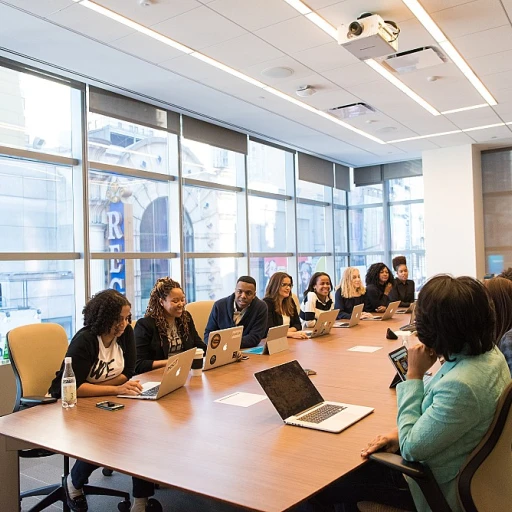
Understanding the Mentoree's Journey
Embarking on a Mentoree's Development Journey
The path of continuous learning involves a dynamic interaction between a mentoree and a mentor, a profound professional journey that can shape the future of both parties involved. Understanding the mentoree's development begins with recognizing that this is more than just learning new skills. It encompasses comprehensive growth and transformation within a structured mentorship environment.
As individuals embark on this journey, they search for guidance, looking to mentors who can provide valuable insights and advice. However, finding the right mentor is not without challenges. It is essential for the mentoree to identify mentors whose experience and expertise align with their professional goals. Leveraging communities such as LinkedIn can be a practical starting point to widen one's professional network and find a compatible mentor.
The mentoree must recognize that learning does not follow a singular path; it's a multifaceted process. Engaging in effective mentor-mentee relationships means dedicating time and effort to actively participate in shared learning experiences. This collaboration often involves the exchange of ideas, resources, and feedback, all vital components that contribute to the mentoree's growth.
Moreover, understanding the contemporary landscape in which continuous learning takes place is crucial. Technology, for instance, plays a pivotal role in facilitating mentorship. Platforms that host rich resources and enable seamless communication between mentors and mentees are invaluable.
For individuals seeking to thrive in fields like health care or technology, embarking on a development journey while fostering robust mentor-mentee relationships can prove invaluable. This symbiotic relationship where mentors share their experiences and mentees actively learn and grow can lead to professional success, making it imperative to be proactive and committed throughout the mentorship process.
The Dynamics of Mentorship
Nurturing the Mentor-Mentee Relationship
The dynamics of mentorship play a pivotal role in continuous learning. At the heart of this dynamic lies the relationship between mentors and mentorees. Building a strong connection fosters an environment conducive to learning and growth.
Communication is key. Both mentorees and mentors should engage in active dialogues, sharing insights and experiences. This exchange enriches the learning process, as it allows the mentoree to gain valuable perspectives from someone who has traversed a similar path.
Trust and mutual respect are essential components. A successful mentor-mentee relationship is built on these foundations. When mentorees feel respected and valued, their willingness to embrace professional development opportunities increases.
The word "mentorship" evokes a sense of guidance. This guidance is not one-dimensional. Mentors also learn from the experience, making it a professional journey for both parties. Embracing community opportunities, such as LinkedIn groups, can bring mentors and mentees together, forming a network that supports continuous learning.
Lastly, as mentorees navigate their learning paths, they should remain open to feedback. Constructive criticism is a crucial element in refining skills and enhancing knowledge, ensuring mentorees effectively leverage their mentors' insights.
For more details on how to foster an effective mentor-mentee relationship, you might want to explore the MESA Development Program for its insights on strengthening these bonds.
Challenges Faced by Mentorees
Overcoming Obstacles in the Mentoring Journey
Embarking on a mentorship journey as a mentoree can present a variety of challenges that are crucial to recognize and address. The path of continuous learning is often marked by hurdles which require strategic navigation. Whether you are a mentoree or a mentor, understanding these obstacles is essential in facilitating a more effective learning experience.
One of the primary challenges faced by mentorees is finding the right mentor. This task is compounded by the need for compatibility in terms of professional goals and personal learning styles. The word "search" takes on a significant role here, demanding meticulous effort and time. Platforms like LinkedIn can serve as valuable sources in connecting mentors and mentees within specific communities.
Once a mentoring relationship is established, another challenge can be the mutual sharing of knowledge. Both mentors and mentees must navigate how to communicate effectively, ensuring that knowledge transfer becomes a two-way street. This is not merely exchanging information; it is about understanding, adapting, and applying shared knowledge for growth.
The difference between January and September can illustrate how time constraints can affect learning. Seasonal workloads, personal commitments, and varying professional demands all play a role in how often mentors and their mentorees can meet. Balancing these time constraints while maintaining momentum in the learning process requires deliberate planning from both parties.
Moreover, breaking through the barrier of professional environment limitations is a must. Certain fields, like health care, present unique challenges due to their high-stakes and demanding nature. Mentorees in such fields need specific strategies to integrate continuous learning within their professional practice effectively.
Mentorees also face challenges in tracking their progress, which is crucial for keeping the learning journey on track. Establishing clear milestones and periodically assessing learning outcomes alongside the mentor can ensure that the efforts yield expected results.
In the broad perspective, transforming potential obstacles into stepping-stones for success is pivotal. The mutual commitment between mentors and mentees to triumph over these challenges not only strengthens their bond but also enhances the learning experience, allowing both the mentor and the mentoree to learn and grow.
For those seeking more insights into continuous learning and its impact, resources such as free optometry continuing education opportunities can provide further understanding.
Strategies for Effective Learning
Effective Learning Strategies for Mentorees
Developing effective strategies is crucial for mentorees aiming to optimize their learning experience. Continuous learning can be a rewarding journey, but it requires a proactive approach from the mentoree. Here are some strategies that can aid in this endeavor:- Setting Clear Objectives: Begin by defining what you want to achieve through your mentorship. This may involve setting short-term and long-term goals that align with your professional ambitions. Clear objectives provide direction and help measure progress over time.
- Open Communication: Regular communication with your mentor can enhance the learning process. Share your thoughts, challenges, and progress honestly. This transparency fosters a rich learning environment and allows your mentor to tailor their guidance to your specific needs.
- Leveraging Technology: Utilize technological tools to streamline the learning process. Platforms like LinkedIn and online communities can be valuable sources for connecting with experts and expanding networks. Wiktionary and other educational resources can support knowledge acquisition.
- Active Participation: Engage actively in mentorship activities. This means not only attending sessions but also contributing ideas and solutions. Active engagement ensures a more dynamic and fruitful mentoring experience.
- Feedback and Reflection: Seek feedback receptively and reflect on it to improve continuously. Constructive feedback from mentors can highlight areas for improvement that you might not see yourself.
The Impact of Technology on Mentoring
Technological Advancements Shaping Modern Mentorship
In today's fast-paced world, technology has dramatically changed how mentorship functions, making it a pivotal component of continuous learning. The digital age empowers both mentors and mentorees with tools that enhance the mentorship experience, offering endless possibilities to grow professionally. One significant advantage is the accessibility of online platforms where mentors and mentorees can connect seamlessly. Platforms like LinkedIn have become invaluable resources for people seeking to find a mentoree or mentor. These platforms allow individuals to share experiences, learn from each other's expertise, and build a community of mentors and mentees that enriches the collective knowledge base. Moreover, the proliferation of communication tools such as video conferencing and instant messaging enables real-time, interactive engagement regardless of geographical barriers. This ensures that the mentorship relationship can be maintained and nurtured over time, contributing to the development of health care professionals and other fields. The ability to schedule regular touchpoints and share resources digitally helps sustain momentum in the mentorship process. Technology also supports mentorship by making information easily accessible. Online search engines and databases, such as Wiktionary, offer rich sources of professional knowledge. Mentorees can now independently learn and grow by exploring various subjects pertinent to their fields. The digital climate encourages mentees to engage in continuous learning on their own time, with guidance from their mentors. Furthermore, wearable technology and other digital tools can track learning progress and challenge mentorees, providing data that mentors can use to tailor their guidance and strategies. The insights gleaned can be instrumental in ensuring that both parties find the mentorship experience rewarding and impactful. In summary, technology serves as a powerful enabler in the mentorship dynamic, fostering an environment where mentors and mentorees can collectively thrive. As tools and platforms continue to evolve, the potential for transformative mentorship will undoubtedly expand, continuously reshaping the landscape of learning and development.Measuring Success in Continuous Learning
Evaluating Progress and Growth in Continuous Learning
Continuously learning requires both the mentoree and the mentor to regularly assess progress and growth to ensure the learning goals are being met. Success in this context is determined not just by the acquisition of new knowledge but also by how effectively the information is applied in practical situations over time. Here are some key factors to consider when measuring success in continuous learning:
- Set Clear Goals: At the beginning of the mentorship journey, it is crucial to establish specific and measurable goals. These objectives serve as a roadmap, guiding both the mentor and mentee and helping to identify when milestones are achieved.
- Regular Feedback and Reflection: Continuous feedback from the mentor helps the mentoree understand their progress. Additionally, self-reflection encourages mentees to assess their understanding and identify areas for improvement.
- Utilizing Technology: Digital tools and platforms can track learning activities and provide analytics on the mentor mentee engagement. This data serves as a valuable source to measure the advancement of skills and knowledge.
- Real-World Application: Success is further validated by the mentoree's ability to apply learned skills to solve problems, innovate, and contribute meaningfully in professional settings, such as health care and other sectors.
- Building a Professional Network: Engaging with the community, such as on LinkedIn or mentorship networks, enables the sharing of experiences and opens opportunities for both personal and professional growth. A strong network serves as an indicator of effective continuous learning.
The dynamics of mentorship emphasize that success is not a solitary journey. It is a collective effort, driven by the interactions and shared learning between the mentor, mentee, and the larger community. By setting clear objectives and actively engaging in reflective practices, mentorees can ensure that their continuous learning journey remains effective and rewarding.













